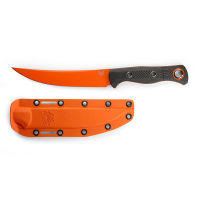
Course
Small Bites
Jerky is the ultimate backcountry provision to provide extra protein and calories for long days in the field. I am certain many of you have your own tried and true jerky recipe, but perhaps you’re looking to shake things up a bit.
My favorite recipe is loosely adapted from Thailand’s own version of jerky, called Heavenly Beef, where thin marinated strips of beef are laid out in the sun to dry and then fried. Since the goal is to preserve meat for weeks or even months, I won’t be frying mine after dehydrating.
I used a roast from my last buck for this recipe. However, I have made plenty of jerky using Canada geese that turned out great. The trick is to slice between 1/8” and 1/4” thick, and it’s easier to make these thin cuts if your meat is partially frozen instead of fully defrosted.
To infuse the meat with the most flavor, let it marinate between 24 and 48 hours. The longer it marinates, the saltier it will get. As it dries out, the water is removed from the meat, concentrating the delicious flavors.
Ingredients
- 2 1/2 lb. meat, trimmed
- 2/3 cup soy sauce
- 1/4 cup water
- 1 tbsp. fish sauce
- 2 tbsp. lime juice (one lime)
- 1 1/2 tbsp. chili paste
- 3 tbsp. brown sugar
- 3 cloves garlic
- 1/4 tsp. dried coriander
- 1/2 tsp. instacure #1 (curing salt)
- 1/4 tsp. cayenne powder &/ red pepper flakes (optional for extra spice)
- 1 tsp. sesame seeds
Also works with
Special equipment
Preparation
- Slice the meat against the grain between 1/8” and 1/4” thick. Place all the sliced meat in a large plastic bag.
- To make the marinade, smash garlic in a mortar and pestle or with the back of your knife to extract the oils. Transfer to a larger bowl and add the remaining ingredients, whisking until well blended. Pour liquids into the bag of meat and mix to coat each piece on both sides. Marinate in fridge for 24-48 hours, tossing and mixing the bag periodically.
- Squeeze out any extra liquids and lay across the screens of your dehydrator. Dehydrate at 160 degrees for about 4-5 hours, depending on thickness. You can use your oven set at the lowest temperature or the “keep warm” feature (no higher than 225 degrees) and crack the door open. Place the meat on a rack for airflow and flip when halfway done. It will take less time if you use an oven, maybe 3-4 hours. The final texture should be bendable, but still hold its shape.
Sign In or Create a Free Account
Reviews
Jerky is the ultimate backcountry provision to provide extra protein and calories for long days in the field. I am certain many of you have your own tried and true jerky recipe, but perhaps you’re looking to shake things up a bit.
My favorite recipe is loosely adapted from Thailand’s own version of jerky, called Heavenly Beef, where thin marinated strips of beef are laid out in the sun to dry and then fried. Since the goal is to preserve meat for weeks or even months, I won’t be frying mine after dehydrating.
I used a roast from my last buck for this recipe. However, I have made plenty of jerky using Canada geese that turned out great. The trick is to slice between 1/8” and 1/4” thick, and it’s easier to make these thin cuts if your meat is partially frozen instead of fully defrosted.
To infuse the meat with the most flavor, let it marinate between 24 and 48 hours. The longer it marinates, the saltier it will get. As it dries out, the water is removed from the meat, concentrating the delicious flavors.
Ingredients
- 2 1/2 lb. meat, trimmed
- 2/3 cup soy sauce
- 1/4 cup water
- 1 tbsp. fish sauce
- 2 tbsp. lime juice (one lime)
- 1 1/2 tbsp. chili paste
- 3 tbsp. brown sugar
- 3 cloves garlic
- 1/4 tsp. dried coriander
- 1/2 tsp. instacure #1 (curing salt)
- 1/4 tsp. cayenne powder &/ red pepper flakes (optional for extra spice)
- 1 tsp. sesame seeds
Also works with
Special equipment
Preparation
- Slice the meat against the grain between 1/8” and 1/4” thick. Place all the sliced meat in a large plastic bag.
- To make the marinade, smash garlic in a mortar and pestle or with the back of your knife to extract the oils. Transfer to a larger bowl and add the remaining ingredients, whisking until well blended. Pour liquids into the bag of meat and mix to coat each piece on both sides. Marinate in fridge for 24-48 hours, tossing and mixing the bag periodically.
- Squeeze out any extra liquids and lay across the screens of your dehydrator. Dehydrate at 160 degrees for about 4-5 hours, depending on thickness. You can use your oven set at the lowest temperature or the “keep warm” feature (no higher than 225 degrees) and crack the door open. Place the meat on a rack for airflow and flip when halfway done. It will take less time if you use an oven, maybe 3-4 hours. The final texture should be bendable, but still hold its shape.




